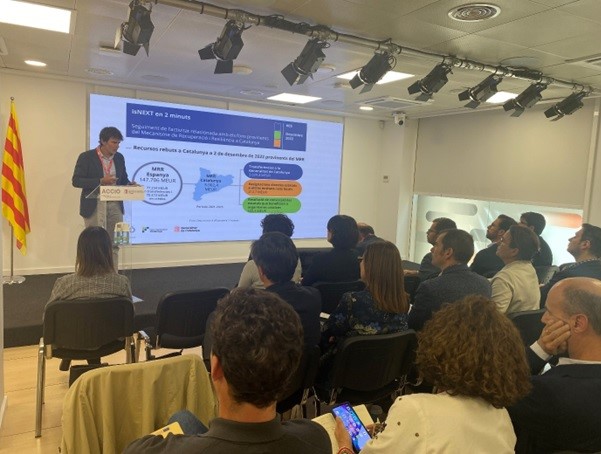Representatives of Ciment Català attended last Thursday at ACCIÓ headquarters in Barcelona the presentation of the Strategic Project for Economic Recovery and Transformation (PERTE) of industrial decarbonization, the latest to join the ecosystem for the distribution of European funds Next Generation . It is a PERTE aimed at the Spanish manufacturing sector that aims to decarbonise the industrial sector by, among others, promoting energy security, encouraging the use of renewable energies and environmental protection, as well as the reduction in natural gas consumption. The presentation was made by Roger Ylla Marti, delegate of ACCIÓ in Madrid, Oriol Alcoba Malaspina , director general of Industry of the Generalitat, and Luis Colunga, special commissioner for PERTE for Industrial Decarbonisation.
The project foresees a public investment of 3,100 million euros that will be able to mobilize up to 11,800 million euros of total investment. The investments in decarbonisation and modernization of the manufacturing industry promoted by this PERTE are focused on increasing the competitiveness of the sector by around 10% and may lead to the creation of around 8,000 jobs. In addition, a reduction in emissions is expected that could reach 13 million tons of CO 2 per year. The planned actions will have to be carried out between 2023 and 2026, although the projects could end later.
In this 2023, some actions are planned such as an aid line for the decarbonization of companies and a support line for the development of new highly efficient and decarbonized facilities; a fund to support contracts for carbon differences; and a helpline for companies participating in the renewable hydrogen industrial chain. There is still no exact date for the call, but it is expected to be in September or October this year.
The cement sector in Catalonia has long since made clear its ambition to achieve zero net emissions along the cement and concrete value chain with the Roadmap to achieve climate neutrality by 2050 , investing more than 160 million euros in this goal during the last two decades, and this commitment, with the investments it implies, is absolute.
On the other hand, Ciment Català he is also part of the Monitoring Committee of the Voluntary Agreement for the efficiency in the use of resources and the transition towards a Circular Economy of the Catalan cement industry , in which he maintains the commitment of the cement industrial sector to reach at least 60% replacement of fossil fuels by alternative fuels based totally or partially on biomass, almost immediately, with the aim of reducing greenhouse gas emissions. Likewise, the sector undertakes to contribute to the policies and strategies established to increase the valorization of waste that is generated in economic and social activity, at the same time that employers have multiplied their institutional activity to raise public administrations’ awareness of the need to promote aid and investments that promote the industrial fabric and the progress of society, in a context of crisis in which Catalan factories have accumulated 11 consecutive years of stagnation, with insufficient production and sales volumes for a country competitive

